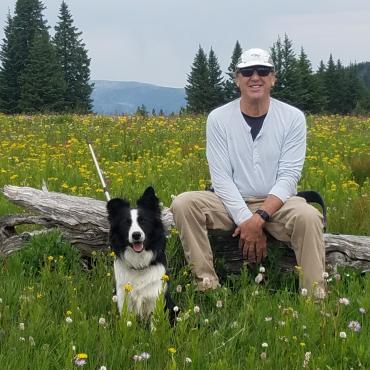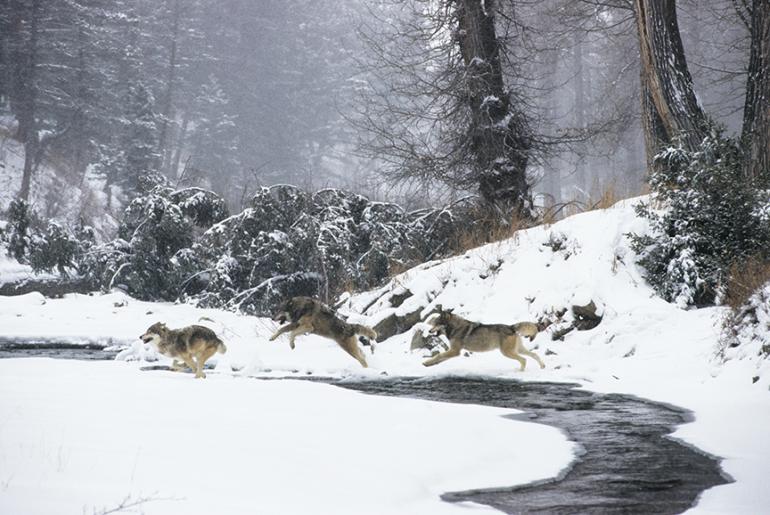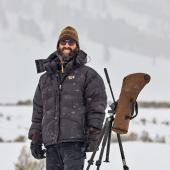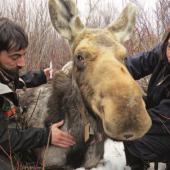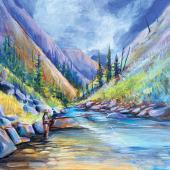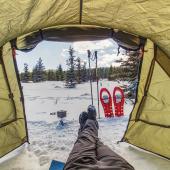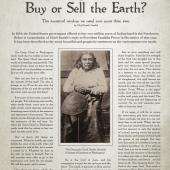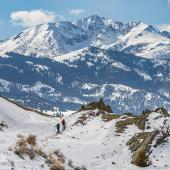Honing In
We watched the wolves patrol the river outside Bozeman that night a few days after the ice jam gave way. Their moonlit silhouettes shuffled rhythmically against the new-fallen snow. “It’s like a dream,” she said. “Such articulate connection, so rhythmic and real. I count a dozen. A pack like that should have a name.”
“Call them the Gallatin pack. The Gallatin fish are theirs,” I said.
“Who’d have thought the fish kill could bring the wolves from so far?”
“The ice jam brought us together.” She watched the wolves connect, each to their paired other and to all the others. “Do the wolves know we’re watching them?” she asked.
“I believe so. What wolves do not see, they smell. A portion of their lizard brain is devoted to smell. They possess that long-evolved vomeronasal gland—an accessory scent gland. It’s an ancient organ with which to smell fear and friendliness, you know, and fish.” I smiled. “The scent gland that lured them out of the Park to harvest the fish-kill from the ice jam.”
“We must smell okay to them,” Angie declared, sniffing the air. The atmosphere from inside the room blew past us, our scent. She had come to witness the ice jam’s devastation. She had heard fish had been injured, and what about the otters?
We’d ended up in my loft by night… and then up came the moon. As we watched it rise, the wolves came back trotting up the jagged frozen river before us, harvesting the broken fish.
“We must smell harmonious,” I told her. She laughed.
“We harbor no malice toward wolves. We have no guns, traps, or snares. Wolves have a sense of what people are up to when it comes to survival. They seem to know who’s after them, and who isn’t. The fish-kill caught everyone by surprise but the wolves, it seems.”
“You think the wolves know what we are up to?”
“Yes. Probably why we don’t worry them, eh? Wolves know the workings of mankind. Wolves thrive on togetherness and cooperation, on group survival. It’s survival of the fittest groups and pairs, you know.”
“Yes,” she said. “Look at them, working the river together, each orchestrating their role in concert with all the others. A leader finds the fish, and shows paired others. Pairs guard the flanks, ahead and behind.”
“Group survival is why certain wolves became dogs, you know. It seems 100,000 years ago, a clade of wolves began following early humans wandering across Asia. Over time, those folk-following wolves merged with the humans they shadowed, providing a protective role for the human wanderers. Soon the dogs helped the humans hunt.”
“And fish. It seems wolves or dogs may have taught men to fish.
“Yes, and fish. Clever creatures, wolves.
Between fish, the wolves played.
“After 80,000 years of shepherding humans, dogs no longer behaved wildly. Invited in from the cold, dogs effectively blended with human society. Group survival doubled with the merging of dog with man, and then tripled up with horses. Dog and horse facilitated the development of what we now call culture, and, eventually civilization.”
“So the wolf-dogs came to the people?”
“In part. Likely, neither species approached the other intentionally—more thrown together across the savannah of time. That’s the science. It is said these wolf-dogs eventually provided the security for humans to comfortably sit around the fire and develop language.”
“All leading to what we have today?” she asked.
“For better or worse. The merging of species is the sharing of social constructs. Domestication happens if two species share enough.”
“Dog and man share plenty,” I added.
“But not dog and wolf?” The Gallatin River arched around the property in a great semi-circle. The wolves flowed around us, together, full of fish, headed back to the Park.
“Certain wolves decided to follow the grazers, taking their chances with hooves rather than with the minds of men.”
“Not a bad decision altogether.” A pair of wolves trotted along the near flank of our frozen river. They danced and whiffed their way though the snowy pasture below. The pack disappeared upriver with the moon, leaving their crisscrossed harmony of tracks. The ravens followed by day, cleaning up the leavings.
Now, the wolves have left, and so has she. The ice jam is long gone. The trout have returned and the otters take their turn.
Sid Gustafson is a veterinarian, poet, and writer of short stories.

